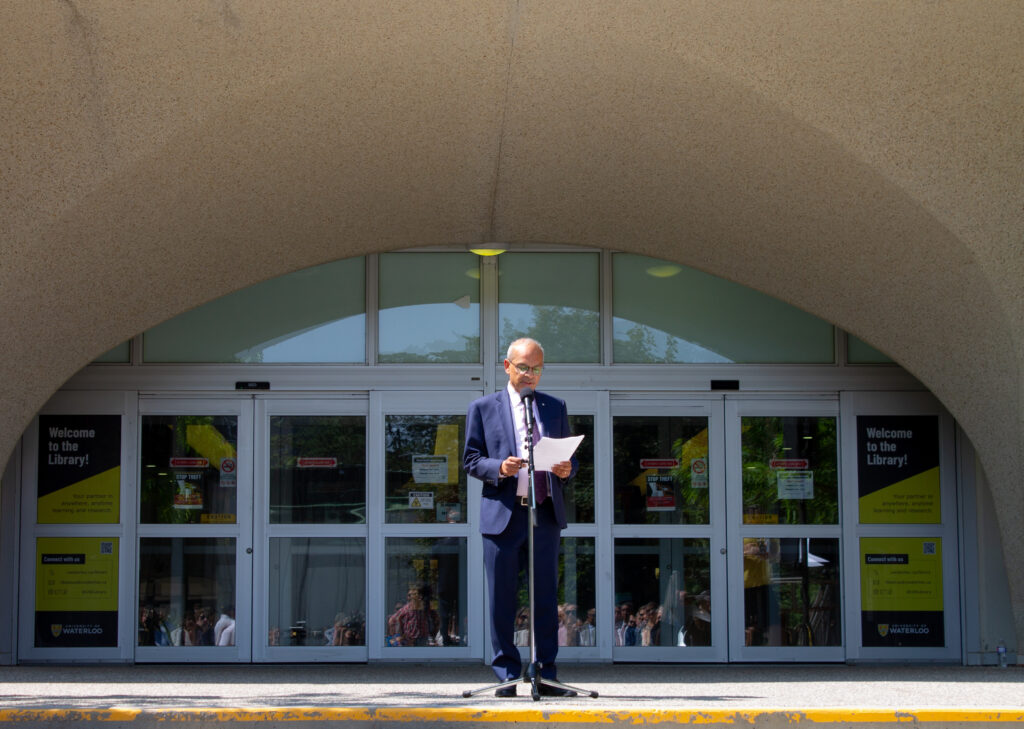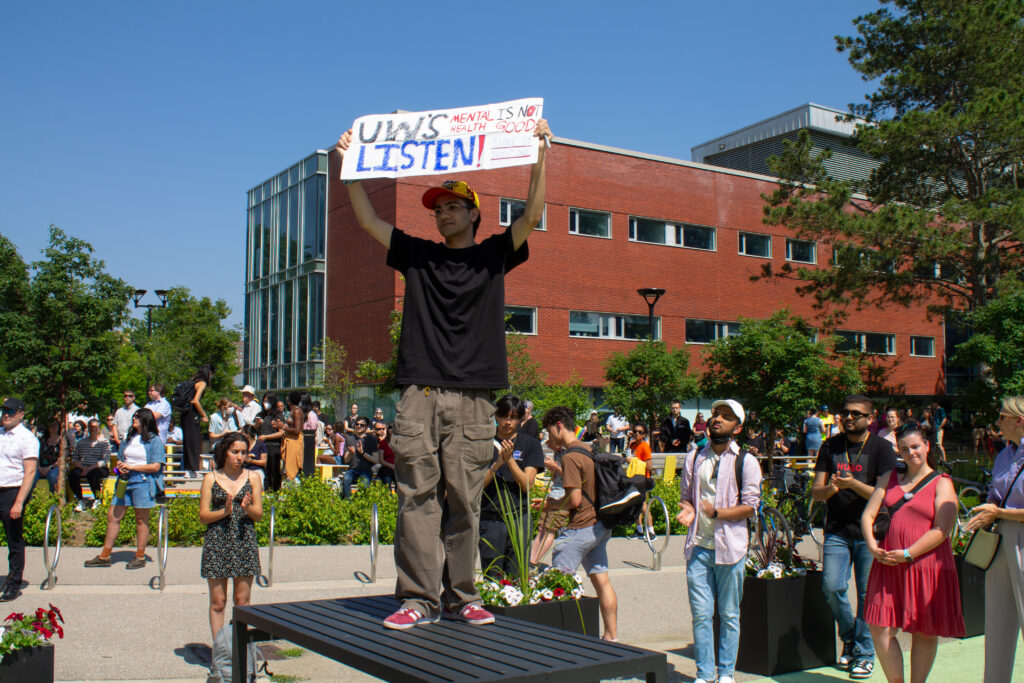Following Wednesday’s attack on a gender issues class in Hagey Hall, students and faculty were invited by UW administration to gather on Thursday at 3:15 p.m. in the Arts Quad to “stand in solidarity against gender-based violence and all other forms of hatred and bigotry,” as stated in an email from the Registrar’s Office.
President and vice-chancellor Vivek Goel opened the event at 3:30 p.m. with a speech in which he confirmed the targeted nature of the attack, aimed at the concepts of gender expression and gender identity, and reiterated UW’s commitment to “fostering an inclusive, safe, and welcoming environment” to all its members. “There [are] those who’d like to intimidate us. They want us to be afraid … to learn … to share … to speak our truths. But we will not let them deter us from proclaiming loudly our values of inclusion and openness,” he said.
Goel also announced that the Pride and Two-Spirit flags currently hanging on campus to celebrate Pride month will remain in place until the end of July as a symbol of UW’s stance against hate-motivated violence and continued support for the 2SLGBTQIA+ community.
Goel’s remarks were followed by a minute of silence at 3:37 p.m., matching the approximate time at which the stabbing incident took place the previous day.

Brief speeches by Dean of Arts Sheila Ager and WUSA president Rory Norris followed.
Ager acknowledged her own shock and anger at the fact that a hate crime had taken place on campus, but emphasized the need to foster a strong community and continue to support one another. Similarly, Norris stressed the importance of reconnecting and building supports, but also highlighted student’s perspectives on the situation and his desire that policies and procedures be reviewed to improve how violent incidents on campus are handled. Norris also noted that WUSA’s student-run services will struggle to operate in the short-term as student staff require time to recover before they can support the community.
A traditional smudging ceremony led by Elder Myeengun Henry of the Anishinaabeg tribe, resident Indigenous Knowledge Keeper at UW, marked the end of the event. Henry expressed gratitude towards the UW administration for incorporating Indigenous perspectives into the event and emphasized the importance of initiating a collective healing process as soon as possible to promote growth within the community. The smudging ceremony itself consisted of a traditional Indigenous healing song, followed by lighting a tobacco-filled smudge bowl, whose smoke was slowly blown around the Arts Quad to complete the cleansing ritual.
Goel, Ager and Norris each addressed the disproportionate impact the attack is likely to have on women and the 2SLGBTQIA+ community, with both Goel and Ager encouraging members of these communities to take time off from their work and academic obligations if they deemed it necessary. The two also thanked WRPS Chief Mark Crowell as well as the emergency responders, paramedics, and IMPACT mental health specialists who provided aid at the time of the incident.
Reaction of student attendees
Before Henry lit the smudge bowl, Amir Tabatabaie, a 3A honours psychology student, stood on a table while holding a sign reading “UW’S MENTAL HEALTH IS NOT GOOD. LISTEN!” and proclaimed his dissatisfaction with the current state of mental health services at the university, as well as drawing parallels between Wednesday’s events and the stabbing incident that took place last year at the CMH residence on campus.

Tabatabaie later explained his demonstration, saying, “It was meant to be more organized; I was meant to write a technical report, so I have all the evidence and the facts… However, yesterday’s incident made it seem more urgent to me, so I decided that today I would speak up and hopefully gain the platform to voice my concern later down the line.”
When asked about how exactly Wednesday’s stabbing made the situation seem more urgent, Tabatabaie explained how Wednesday’s stabbing fit into a pattern of violent events on campus followed by an unsatisfactory response by UW authorities, highlighting a lack of transparency between the administration and the student body.
James Chow, a graduate student and PHIL 202 class member who was present at the time of the attack, was similarly dismayed at the university’s seeming lack of concrete action. “I found it a bit embarrassing that a student holding up a sign had to bring up that the university does not have enough counselors… We honestly should just have more counselors period… It’s specific, actionable, and objectively you can measure it. There’s no way for the school to get out of [it with] some wishy-washy, feel-good bullshit.”
Similar feelings of frustration and dissatisfaction were echoed by other students present at the event. “I feel this personally as a member of the community. I think that this is not fair and it feels as if that could’ve been me, and that doesn’t make me feel like UW is necessarily a safe space to be in,” said Leonardo Cabrera Ortiz, a 3A nanotechnology engineering student. “We thought that [the CMH stabbing] was a one-off event, and it’s really bizarre for that to happen two years in a row… seems like something should’ve been done to prevent this from happening,” said Mark Ositashvili, a 2B nanotechnology engineering student.
“I do acknowledge the point of symbols, of leaving up the Pride flag stuff and whatever, but I think we should have the attitude of ‘yes and’ — yes this plus other things,” Chow concluded.






























